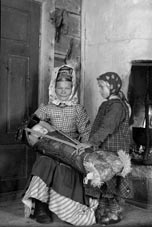| |
|
|
Skolt Sámi musical tradition
The way a Skolt Sámi woman called her livestock - tame reindeer
or sheep - was like a musical performance. Her voice would jingle, "jam"
and coax; she called the animals by their names and talked to them in
the sweetest words. With the disappearance of domestic animals, this special
skill - which could be considered part of folk music - was also lost.
The leu'dd - the Skolt Sámi yoik - became famous when two researchers
of folk music - Armas Launis and A. O. Väisänen - dealt with
this Skolt Sámi way of singing, too, in their writings and papers.
Later, Heikki Laininen, a professor of folk music, has also studied leu'dds.
Leu'dds can be divided into short, aphorismic leu'dds concerning animals,
mythical leu'dds dealing with the origin and history of places, for example,
and leu'dds on persons. The last-mentioned ones are the most common and
maybe best-known leu'dds today.
Compared to the North Sámi yoiks, Skolt Sámi leu'dds are
more melodic and epic. A leu'dd concerning a person will often tell about
the turning-points of human life, like about falling in love, about proposals
and about getting married, but also about the incidents of everyday life.
Traditionally, leu'dds have been sung when alone or when making handicraft,
or while rowing the boat or driving with the reindeer. However, leu'dds
have also been sung in social occasions: during celebrations, when sitting
around the table and drinking toasts. Leu'dds have also been recorded,
with singers Vassi Semenoja, Helena Semenoff and Domna Fofonoff from Sevettijärvi
as the performing artists. Sámi Museum Siida and the Finnish Folk Music Institute published a book with a cd under the title Maaddârää'jji leeu'd - Esivanhempien leuddit in 2007. It is based on the recordings and photographs of professor Erkki Alakönni. Marko Jouste, Elias Mosnikoff and Seija Sivertsen have shared the editing work. The World Music Centre published in 2007 a book called Son vuäinn - Hän näkee - Skolt Sámi Leudds from Kola Peninsula.
 |
| The baby was lulled
to sleep in a Skolt Sámi cradle, or kietkam, by singing
lullabies. Photo: National Board of Antiquities |
The Skolt Sámi musical tradition also contains lullabies and laments,
just like the traditions of other eastern groups. The baby was lulled
to sleep in a Skolt Sámi cradle, or kietkam, by singing lullabies
that were similar to those of Russian Karelia. The habit of singing laments
is also closely linked with the Karelian and Russian tradition of wailing.
Laments were traditionally sung at funerals and when men left to war or
the bride left her home.
Folk dances have spread to the Kola Peninsula through the east. At first,
people danced to the accompaniment of singing, and, in the late 1800s,
to the accompaniment of accordions that had two or three rows of buttons,
and, later, to the music of mouth-organs, too. The line dance Ay nam ladan,
or the Sowing of Buckwheat, is one of oldest dances danced by the Skolt
Sámi. The quadrille is perhaps their most famous dance, but it
was, at one time, as common to dance korobushka, pas d'espagne, krakowiak and other European and Russian ballroom and folk dances.
There are video recordings of Skolt Sámi folk dances, but, today,
there are almost no Skolt Sámi who would master accompanying dancing
with singing. Neither do we find any players of the instruments that were
used for accompanying traditional dances - accordions or mouth-organs
- in the young generation. However, the tradition of leu'dd singing has
revived and there are young singers who even perform today. Light music,
too, has been made with Skolt Sámi lyrics ever since the 1970s.
Jaakko Gauriloff is the best-known master of light music but of the traditional
leu'dd, too. He has come out with records, for example Kuä'cǩǩem suäjai vuel'nn, that contain his Skolt Sámi
melodical songs.
Recently, the Skolt Sámi musical traditions have taken another turn: Tiina Sanila Band has published rock music in Skolt Sámi.
|
|
